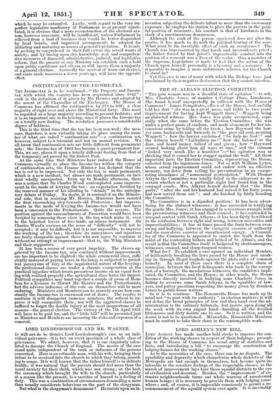CONTINUATION OF THE 1NCOME-TAX.
THE Income-tax is to be continued—" the Property and Income tax with which the country has been acquainted since 1842 " : such is the definition of it given by Mr. Herries and adopted by the assent of the Chancellor of the Exchequer. The House of Commons has affirmed the continuation by 278 to 230; a clear majority of eight over and above the Ministerial forty. This must be regarded as a large majority according to present fashions ; and it is an important one in its bearing, since it places the Income-tax on a totally new footing. The resolution possesses a considerable degree of boldness. This is the third time that the tax has been renewed : the mea- sure, therefore, is now virtually taking its place among the num- ber of what are called " continuation acts "—a continuation act, however, subject to a triennial and not an annual revision. We all know that continuation acts are little different from permanent acts : the Income-tax of 1842 has become a quasi-permanent law. This, we say, places it upon a totally different footing from that of the temporary act passed by Sir Robert Peel. At the same time that Ministers have induced the House of Commons virtually to place the Income-tax within the category of continuation acts, the Finance Minister has declared that the tax is not to be improved. Not only the tax is made permanent, which is a new incident, but abuses are made permanent, an inci- dent wholly unexpected. Even up to Monday afternoon, there was a notion that Sir Charles Wood contemplated some improve- ment in the mode of levying the tax ; an expectation fortified by the reserved manner of his alluding to "details" in the anticipa- tory debate of Friday. No doubt, it is contended on the Ministe- rial side, that in resisting Mr. Herries, Ministers have resisted the first encroaching step towards old Protection : but improve- ments in the mode of levying the Income-tax would not have been a concession to the Protectionists. Quite the reverse. The position against the encroachments of Protection would have been fcn-qted by removing those vices in the tax which make it, even to the heartiest lovers of free trade, an odious instrument. Sir Charles Wood's excuses on the score of " difficulty " will not be accepted : it may be difficult, but it is not impossible, to improve the working of the tax ; therefore its annoyances and injustices are fairly chargeable against those who now agree to continue it without an attempt at improvement—that is, the Whig Ministers and their supporters.
It has been a course of very great impolicy. The classes ag- grieved by the Income-tax, now continued without improvement, are too important to be slighted : the whole commercial class, suffi- ciently annoyed at paying taxes in the lump, is subjected to period- ical paroxysms of fury at the inquisitorial nature of the levying; the professional classes are under a chronic exasperation at the practical injustice which treats precarious income on an equal foot- ing with realized property ; the agricultural class hates the impost. Political sympathies may band together a couple of gross of Mem- bers for a division to thwart Mr. 'ferries and the Protectionists, but the adverse influence of the vote on themselves will be more enduring. Ministers and Members can be scarcely aware how con- stantly the Income-tax is canvassed out of doors. The resolve to continue it will disappoint immense numbers, the refusal to im- prove it will exasperate them ; nor will the aggrieved classes be suffered to forget the double injury at the most inopportune of all seasons—the general election. The victory of the 7th April 1851 will have to be paid. for, and the "little bill" will be presented just as Ministers and Members are incurring the risks and expenses of a removal.


























 Previous page
Previous page